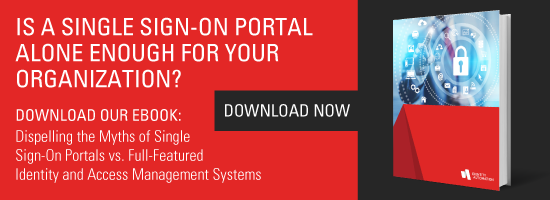 When selecting a solution for your organization, you may find yourself weighing the merits of point solutions versus a single platform. In part 1 of this series, two considerations were weighed: procurement effort and implementation difficulty. In part 2, we discussed integration complexity. This post will cover five long-term factors you should consider.
When selecting a solution for your organization, you may find yourself weighing the merits of point solutions versus a single platform. In part 1 of this series, two considerations were weighed: procurement effort and implementation difficulty. In part 2, we discussed integration complexity. This post will cover five long-term factors you should consider.
"Where do you want to be in five years’ time?" While this is a favorite question of interviewers, it’s also something you should be asking yourself about your identity management solution, along with a few other questions. In the next half decade, do you want a solution that the vendor will support because the company is still around? Do you want a solution for which the vendor will provide comprehensive, in-depth training and upgrades? And how much money do you want to spend to achieve these goals?
Now obviously we’re a little biased, but we think the secret to finding an identity management solution that offers long-term support, excellent training options, fewer product upgrades, better vendor longevity, and lower cost is to choose a solution that offers a platform from a single vendor. Read on to learn how this choice will save you time, money, and aggravation in the long run.
Technical Support
It’s every IT director’s worst nightmare—something goes wrong with an application or system, and you need to call tech support. If you are coordinating multiple point solutions from several vendors, the situation becomes an even greater ordeal.
- Single vendor platform: When you choose a single vendor, you only have to turn to one place for support. Because these platforms are sold by larger vendors, they have the resources to provide a wider range of support packages (and you’ll find at least one package that offers 24/7/365 access).
- Multi-vendor point products: When a glitch happens, you have to reach out to each vendor, and each vendor has its own support processes. Many point solutions come from smaller vendors who lack the bandwidth to offer the extensive support (read: after office hours) provided by larger vendors. In today’s round-the-clock world, that just won’t cut it. Moreover, many point solution vendors are more focused on making the sale than providing support, so don’t expect a great deal of help from them.
Training
In order to get the highest ROI on your identity management solution, your team needs training to learn how to use it. Single vendor identity management platforms have the advantage in this regard.
- Single vendor platform: Vendors selling a single platform tend to offer a wider variety of training options, which will be more in-depth. In addition, these training sessions are generally live and in-person.
- Multi-vendor point products: By contrast, your sale for a point solution vendor won't represent an exceptional transaction. As a result, training options aren’t likely to be as extensive; don’t be surprised if you’re directed to product documentation pages on the vendor’s website. If you absolutely must buy point solutions, negotiate for training-as-a-service.
Upgrades
It’s a fact of life: over the course of any software solution’s product lifecycle, you will need upgrades to keep it working properly. While they’re a necessity, upgrades can also be a pain because in many cases, they require downtime.
- Single vendor platform: Vendors selling an identity management platform will release fewer upgrades, but these upgrades will cover more aspects of the solution.
- Multi-vendor point products: Point solution vendors, on the other hand, release more upgrades that will update one or two functions at a time. However, be aware that point solution upgrades could negatively affect existing integrations.
Vendor Longevity
When selecting a vendor for a software solution (especially for a mission-critical area, such as identity management), you want that company to be around for the long haul. Vendors specializing in platforms tend to have better longevity.
- Single vendor platform: Software companies that develop platforms are generally larger than organizations offering point solutions. They tend to have a bigger, more established customer base with a track record of success. These platform vendors have dealt with a broad range of use cases, so a shift in technology won’t make them obsolete.
- Multi-vendor point products: Point solution vendors, on the other hand, are usually smaller firms. This can lead to a few outcomes: either they can’t get the volume of business they need to survive (even if they offer the best-of-breed solution), or they attract the attention of a larger vendor and get bought out. There is no guarantee the larger vendor will continue to offer your solution after the merger or buyout, which would leave you high and dry.
Cost
We’ve saved the most compelling argument for last. Single vendor platforms, in the long run, cost less than point solutions from several vendors. Here’s why:
- Single vendor platform: For starters, a license for an identity management platform will cost less than the amount you will need to purchase licenses for the four to five products necessary to provide Identity and Access Management (IAM), Multi-Factor Authentication (MFA), and Privileged Access Management (PAM). Managing a single platform is also cheaper than managing multiple point solutions; research from the Aberdeen Group shows that IAM platforms cost 48% less per year than multiple point solutions. Additionally, it’s less expensive to integrate one platform with existing solutions than to integrate multiple solutions.
- Multi-vendor point products: As covered above, the price of point products will be higher because you’ll be forced to buy separate, individual modules to constitute your solution. You’ll also have to deal with separate services contracts and integration costs for each.
In the long run, every organization wants to be agile, competitive, and thriving. An identity management platform helps you achieve that goal by keeping you secure. Choosing a platform, as opposed to point solutions, will save you time, money, and headaches. This will allow you to focus on business growth, instead of just managing risk.
In part 4 of this series, we’ll cover two final considerations: best-of-breed and security, as well as lay out a chart with a breakdown of all the factors examined in this series.

Comments